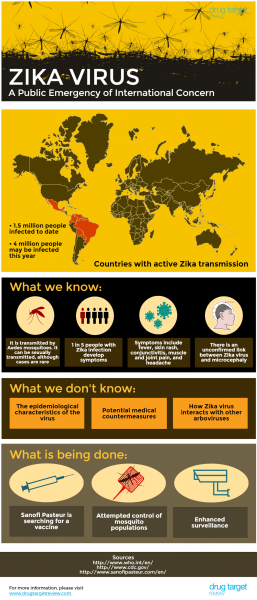Zika Virus: a public emergency of international concern
Posted: 4 February 2016 | Victoria White, Digital Content Producer, Drug Target Review | 1 comment
The Zika virus has taken hold in South America. Its possible link to microcephaly in newborn babies and neurological conditions has led the World Health Organization to declare a Public Health Emergency of International Concern. Here we discuss the virus, countermeasures and the race for a vaccine…
The World Health Organization (WHO) has estimated that up to 1.5 million in Brazil have been infected with the Zika virus since the outbreak began last year. WHO says that up to 4 million people could be infected this year.
But what is Zika?
The Zika virus, a mosquito-borne flavivirus related to the yellow fever, dengue and West Nile viruses, has taken hold in South America.
Very little is known at the moment and there is currently no vaccine available. The virus was first identified in Uganda in rhesus monkeys in 1947 and was then identified in humans in 1952. Since then there have been outbreaks recorded in Africa, the Americas, Asia and the Pacific.
We created an infographic to break it down for you:
So what is being done to tackle Zika virus?
After convening a panel of experts from around the world, WHO has declared that the microcephaly cases and other neurological disorders reported in Brazil constitutes a Public Health Emergency of International Concern. They have called for an international response to improve surveillance, the detection of infections, congenital malformations, and neurological complications, to intensify the control of mosquito populations, and to expedite the development of diagnostic tests and vaccines.
As there is no vaccine available, the WHO says the most important protective measures are the control of mosquito populations and the prevention of mosquito bites in at-risk individuals, especially pregnant women.
While WHO found no public health justification for restrictions on travel or trade to prevent the spread of Zika virus, the UK National Travel Health Network and Centre is advising those who are pregnant, those who are planning to become pregnant, or those with severe chronic illness or immune system disorders, to seek advice from a health professional before travel to areas where Zika virus outbreaks are currently reported.
In addition, the US Centres for Disease Control and Prevention (CDC) have issued travel recommendations for pregnant women to postpone travel to countries in Latin America and the Caribbean where Zika virus transmission is ongoing.
NHS Blood and Transplant have also introduced a 28 day blood donation deferral for people looking to donate blood who have travelled to countries where the Zika virus is endemic.
Race for a vaccine
Sanofi Pasteur, a leader in vaccine research, has said that it is going to launch an R&D development programme for a Zika virus vaccine.
Driving the new project, Nicholas Jackson, Global Head of Research, Sanofi Pasteur, told Drug Target Review, ‘it is critical for regional and global collaborative efforts to rapidly move forward. We hope to leverage our existing expertise, technologies and infrastructure for our recently licensed dengue vaccine against the Zika virus to rapidly advance a vaccine candidate.’


Dr Nicholas Jackson will be driving the new project for Sanofi Pasteur
Sanofi Pasteur leads the vaccine field for viruses in the same family as Zika virus, with licensed vaccines against Yellow Fever, Japanese Encephalitis and Dengue.
Importantly, the company says its expertise and established R&D and industrial infrastructure for the newly licensed vaccine for dengue, Dengvaxia, can be rapidly leveraged to help understand the spread of Zika virus and potentially speed identification of a vaccine candidate for further clinical development.
Other pharmaceutical companies will also likely follow suit in hunting for a vaccine.
In addition, the Medical Research Council has launched a £1 million rapid response funding initiative to provide novel, critical and timely insights into the nature of the risk posed by the Zika virus and potential avenues for its management or prevention.
Current measures
The incubation period is not clear, but WHO says it is likely to be a few days. While the infection is spread by Aedes aegypti mosquito, there have been rare cases where the the virus has been sexually transmitted, including one recent case in Texas.
Roughly 80% of those infected with the virus do not develop any symptoms, making spread of the virus difficult to track. For those who do develop symptoms, they are usually mild and include fever, skin rashes, conjunctivitis, muscle and joint pain, malaise, and headache. These symptoms last for 2-7 days and can be treated with common pain and fever medicines, rest and plenty of water.
However, during a large outbreak in French Polynesia in 2013 and in the current outbreak in Brazil, there have been reports of an unusual increase in Guillain-Barré syndrome – a condition where the body’s immune system attacks parts of the nervous system. Investigations are being carried out to discover if the increase in cases of the syndrome can be linked to Zika.
In terms of where the virus could spread to, researchers have used environmental data to predict where the Zika-carrying Aedes aegypti mosquitoes can establish themselves. They conclude that Chile and Canada will likely be the only places in the Americas not at risk of local epidemics.
Unconfirmed risks
The outbreak in South America has coincided with a rise in cases of microcephaly in newborn babies. Since October, there have been more than 3,500 reported cases in Brazil (the country had fewer than 150 cases in 2014). On 12 January, the MOH Brazil confirmed that two miscarriages and two infants born at term (37-42 weeks) who died 24 hours after birth, tested positive for the Zika virus. The mothers of these babies had a history of rash and fever during pregnancy.
These findings, together with other evidence collected during 2015, reinforce the possibility of an association between exposure to Zika in pregnancy and congenital malformations. While investigations are ongoing to establish whether there is a link, the evidence is enough for WHO to state “that a causal relationship between Zika infection during pregnancy and microcephaly is strongly suspected”.
Other solutions?
Some researchers are looking to combat the virus at its source – in mosquitoes. The Eliminate Dengue Programme have explored how a bacterium that infects 60% of insects around the world may be used as a tool to combat the spread of dengue, Zika and similar mosquito-borne viruses. The bacterium, Wolbachia, is not naturally found in the Aedes aegypti mosquito. Researchers with Eliminate Dengue have found that when they infect mosquitoes with the bacteria in the lab, it prevents them from transmitting dengue, chikungunya and yellow fever.
“The Eliminate Dengue Programme is doing field experiments to see whether we will be able to replace wild-type, existing populations of mosquitoes with these Wolbachia-infected ones and whether it blocks dengue transmission” said Dr Matthew Aliota, a research scientist in the UW-Madison School of Veterinary Medicine (SVM) and member of the Eliminate Dengue group. “Now, we’re going to start looking at how that might be used for Zika virus control as well in South America.”
Others are claiming fish are the solution:
Source: AJ+
Related conditions
Zika virus
Related organisations
Sanofi Pasteur, World Health Organization (WHO)





Bacterial pathogens Wohlbachia may be susceptible to antibiotic residues in water and sewage habitats and may be important in other insects. Are they present in bees for instance. Is the vector not susceptible to release of sterile male Aedes and would this not be a safer species-specific strategy
Is it known if other mosquito vectors are permissive – as proved to be the case with chikungunya? Also is the Aedes mosquito likely to migrate further north with global warming>